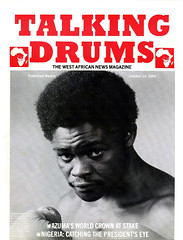Comment
Liberia Goes To The Polls
This is an event that will be watched with more than the closest interest. The very act of people electing their leaders has become something of rarity in Africa and the event therefore has a special attraction.
But then, this is much more than a routine election, because for the great majority of the Liberian people this is the first opportunity that they have of participating in the electoral process which in the pre-April 1980 era, was very much restricted to only a section of the society.
Thus it is not surprising that there should be so many hitches to the preparations.
To start with, there was the problem of credibility that faced the announcement by General Samuel Kanyon Doe that he intended to transfer power to a civilian democratically elected government. The scepticism was reinforced when it turned out that Gen. Doe, in talking about civilian rule, had every intention of including himself in the reckoning of the civilian elected leaders and retaining his military status.
Human nature is such that nobody has any sympathy for the person with the overwhelming odds and it looked to many people as though Gen. Doe had all the advant- ages of all the possible different worlds and that he had so ordered affairs in the country that there could be no meaningful competition to him.
The advantages of incumbency are limitless and Gen. Doe, having decided that he would put himself up for endorsement from the electorate could have afforded to be generous to those who would challenge him in the leadership race.
But the impression persisted that Gen. Doe would give no quarter and would extract every advantage that there was. As the saying goes, all is fair in love and in politics and the Liberian leader ought to be wished every luck if he should insist on getting all the possible advant- ages. Unfortunately, the very concept of democratic elections presupposes fairness and that appeared impossible with a weighted advantage in favour of Gen. Doe.
This feeling has persisted throughout the various skirmishes towards the formation of the parties, their registration and issuance of certificates by the Special Elections Commission (SECOM).
Apart from Gen. Doe's own party, the other three that have gone through the stringent requirements of SECOM, all sound not unduly disposed towards the election of President Doe. If those three parties sound like satellite parties of Gen. Doe's, the three that were refused registration were certainly and unambiguously opposed to the transformation of Gen. Doe into an elected President.
Then there have been the problems of the electoral register, a problem that is not unknown in other parts of West Africa that have gone through the experience of the million elin election. It is being said that out of the one million eligible voters, there are only 700,000 people on the register. If they all vote, or even a sizeable majority of them vote, the percentage would still be more than the United States of America, or the United Kingdom manages when they vote.
All these problems, and many more are obvious to a sophisticated and sceptical world. But it is obviously difficult for that world to comprehend the enormity of the problem that is faced by a country like Liberia trying to accommodate an internationally accepted standard that is adapted to its own peculiar circumstances.
Nobody can properly estimate the difference that there is between a cynical and possibly apathetic western country electorate that does not cast its vote and a Liberian electorate that does not vote because it has never done so. It is so easy to be dismissive of the problems when you have behind you, centuries of tradition of voting. It is very easy to be contemptuous and dismissive of what looks like a rudimentary and crude attempt at imitating a system from the relative protection of a system that already ensures basic life requirements for its people.
But then, many people have pointed out that Ronald Reagan is not necessarily the most capable or effective person that the United States of America can produce or the Republican Party, for that matter, however, it is very rare that the bravest or the wisest or most effective person wins or is even available for election or selection
Everybody is convinced that when the results come to be announced, Gen. Doe, in whatever guise, is going to emerge as the elected leader of Liberia.
He might not be the most capable Liberian around, but that certainty is not a typically Liberian affliction, the process might not have been the fairest, but again that is a weakness that can be seen around the world.
It surely would have been better if Gen. Doe had left the Armed Forces before standing for the elections as he has insisted other people should do, it would have been better if so many difficulties had not been placed in the way of all possible opponents, and it would have been better if the impression has not gained ground that SECOM was only a wing of Gen Doe's party.
However when the Liberian voter enters the cubicle to make his choice on Wednesday, he has the benefit of grappling only with his conscience and he has the opportunity to make his displeasure known.
That is much more than much of Africa has and it should be said, much more than some other Liberians who would have a true revolution would allow in the country, given the chance.
It is the first step forward that Gen Doe saw the need to go to the people.
